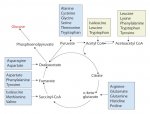I can't comment on the science as I'm a graphic designer, I went to art school, ha. But here's what we're doing.
I'm trying to increase the protein in my partner's diet after the article. A few months ago we went (mostly) vegan, which makes this difficult. I know we are going to have to compromise but I'm not sure where yet. I did in fact manage to do a ketogenic diet myself a few months ago whilst remaining vegan, and lost nearly a stone, but James is quite picky with what he likes to eat, and boy does he like carbs. Especially sandwiches. This leaves me with a rather complex problem. I am managing to get I think 15-25g of protein into each meal though I think, and I use Sunwarrior raw protein which is mostly brown rice based which claims to have a full amino acid profile, I take that after sports, I've started giving that to him twice a day, and miraculously, he likes it. The chocolate flavour. (I'm quite mindful that it sounds like I am talking about a child here... but I have to do all the shopping and whatnot). I feel the carbohydrate content of his meals is still undesirably high though. Bread, potatoes - partly due to my having to compromise on my own energy levels too so things often have to be easy to prepare - crisps after the evening meal. And he eats 3 bananas a day or he complains about gut problems.
Also trying to encourage him to eat nuts as snacks. Bought the new weetabix plus protein as he generally eats weetabix every morning. Especially as I have my own health problems so we have to compromise on a lot of things, to stuff he can prepare himself at least some of the time. I made protein pancakes this morning (chickpea flour has SO much protein - 22g per 100g - and does SO much, I can make a passable scrambled egg or omelette with it as well as various other things) but he wasn't that into it, probably because I added a scoop of pea protein powder which has a weird texture, nor the nutty flaxy protein porridge I made the other morning. I've felt for a while he would benefit from a lower carb diet but I think he struggles with change. Being on benefits too, protein is expensive, especially if you want to be ethical about it. Nuts are pricey! And he doesn't like peanuts!
I've replaced his lunchtime sandwiches with wholegrain tortilla wraps, at 5.5g of protein per wrap that's not a bad amount of protein at all, that's 11g before you add the filling, and at the moment that's a generous portion of quorn chicken style pieces (which have a very respectable amount of protein, the vegan ones actually have more percentage wise) made into a chicken-mayo type affair. The rest of the week I will be doing something with houmous and falafel and maybe some beans or something. Linda McCartney sausages and quarter pounders have loads of protein and are great and I have dehydrated soya mince to make into bolognese. And a bean chilli or something with beans a few times a week. Lentils. Tofu here and there (but it's possible soya is bad for you and James is somewhat concerned about its potential effects on testosterone - not sure about the science on that. I know that if that's true then tempeh is better).
Thinking about buying some fish - salmon etc - but in a way I feel even weirder about that because I love marine life and I know we're kind of messing all that up with overfishing etc. I'm willing to compromise and I would always put James' health first but we both feel that we would like to avoid meat/dairy as far as possible, I do feel that it's possible to get at least enoguh protein for a normal/healthy person from a vegan diet (though I'm not militant about it) and we can't afford/couldn't travel to anywhere that sells truly ethical meat/eggs at least as far as I know at the moment.
One takeaway from this: Sunwarrior vegan protein tastes pretty great.
Man do I talk a lot.

